Saudi Arabia's Vision 2030: A Comprehensive Look at Healthcare Reforms
VerifiedAdded on 2023/05/30
|13
|1471
|357
Essay
AI Summary
This essay provides an overview of Saudi Arabia's Vision 2030, focusing on its goals for the healthcare sector. Introduced by Crown Prince Mohammad bin Salman in 2016, Vision 2030 aims to diversify the Saudi economy, reduce dependence on oil, and improve public services, with healthcare being a key component. The essay highlights the government's initiatives to enhance healthcare services, prevent disease spread, and prepare for pandemics through programs like the National Transformation Program (NTP) 2020. It also addresses the challenges posed by non-communicable diseases and the risks of re-emerging infectious diseases, emphasizing the importance of partnerships with organizations like the CDC and WHO. The increased healthcare budget and construction of new hospitals are discussed as steps toward achieving the goals of Vision 2030, ultimately aiming for a healthier future for the Kingdom of Saudi Arabia.
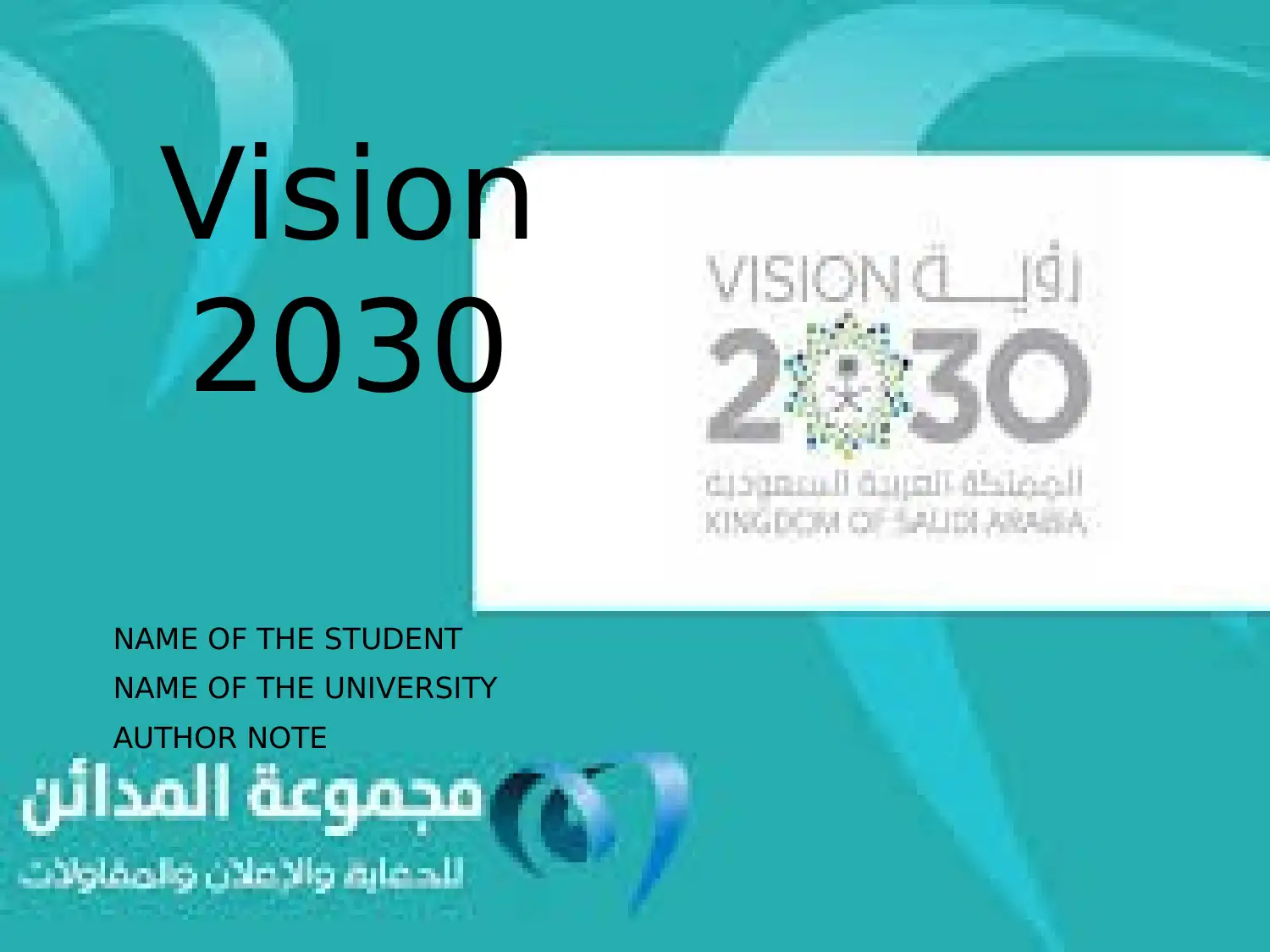
Vision
2030
NAME OF THE STUDENT
NAME OF THE UNIVERSITY
AUTHOR NOTE
2030
NAME OF THE STUDENT
NAME OF THE UNIVERSITY
AUTHOR NOTE
Paraphrase This Document
Need a fresh take? Get an instant paraphrase of this document with our AI Paraphraser
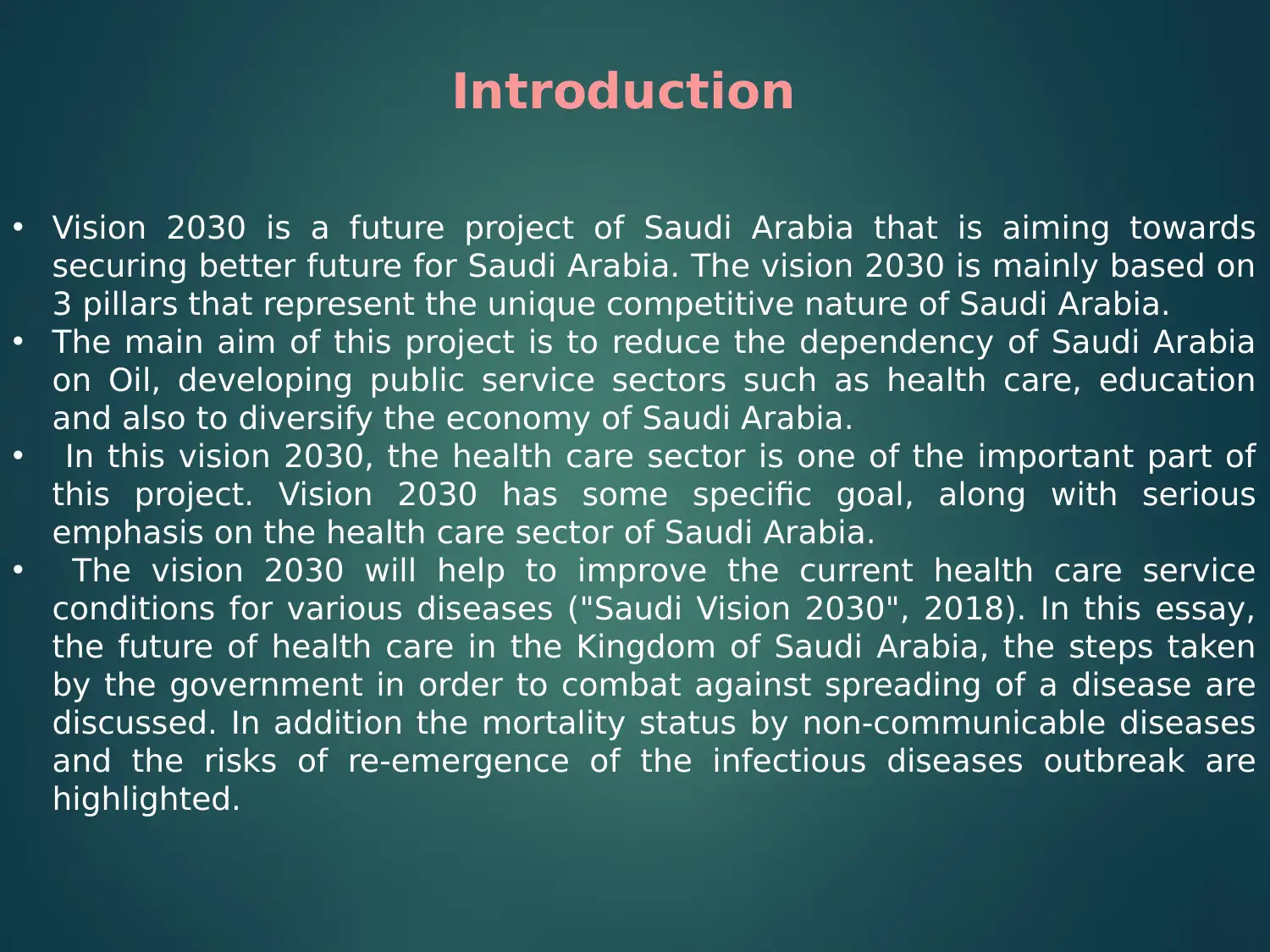
Introduction
• Vision 2030 is a future project of Saudi Arabia that is aiming towards
securing better future for Saudi Arabia. The vision 2030 is mainly based on
3 pillars that represent the unique competitive nature of Saudi Arabia.
• The main aim of this project is to reduce the dependency of Saudi Arabia
on Oil, developing public service sectors such as health care, education
and also to diversify the economy of Saudi Arabia.
• In this vision 2030, the health care sector is one of the important part of
this project. Vision 2030 has some specific goal, along with serious
emphasis on the health care sector of Saudi Arabia.
• The vision 2030 will help to improve the current health care service
conditions for various diseases ("Saudi Vision 2030", 2018). In this essay,
the future of health care in the Kingdom of Saudi Arabia, the steps taken
by the government in order to combat against spreading of a disease are
discussed. In addition the mortality status by non-communicable diseases
and the risks of re-emergence of the infectious diseases outbreak are
highlighted.
• Vision 2030 is a future project of Saudi Arabia that is aiming towards
securing better future for Saudi Arabia. The vision 2030 is mainly based on
3 pillars that represent the unique competitive nature of Saudi Arabia.
• The main aim of this project is to reduce the dependency of Saudi Arabia
on Oil, developing public service sectors such as health care, education
and also to diversify the economy of Saudi Arabia.
• In this vision 2030, the health care sector is one of the important part of
this project. Vision 2030 has some specific goal, along with serious
emphasis on the health care sector of Saudi Arabia.
• The vision 2030 will help to improve the current health care service
conditions for various diseases ("Saudi Vision 2030", 2018). In this essay,
the future of health care in the Kingdom of Saudi Arabia, the steps taken
by the government in order to combat against spreading of a disease are
discussed. In addition the mortality status by non-communicable diseases
and the risks of re-emergence of the infectious diseases outbreak are
highlighted.
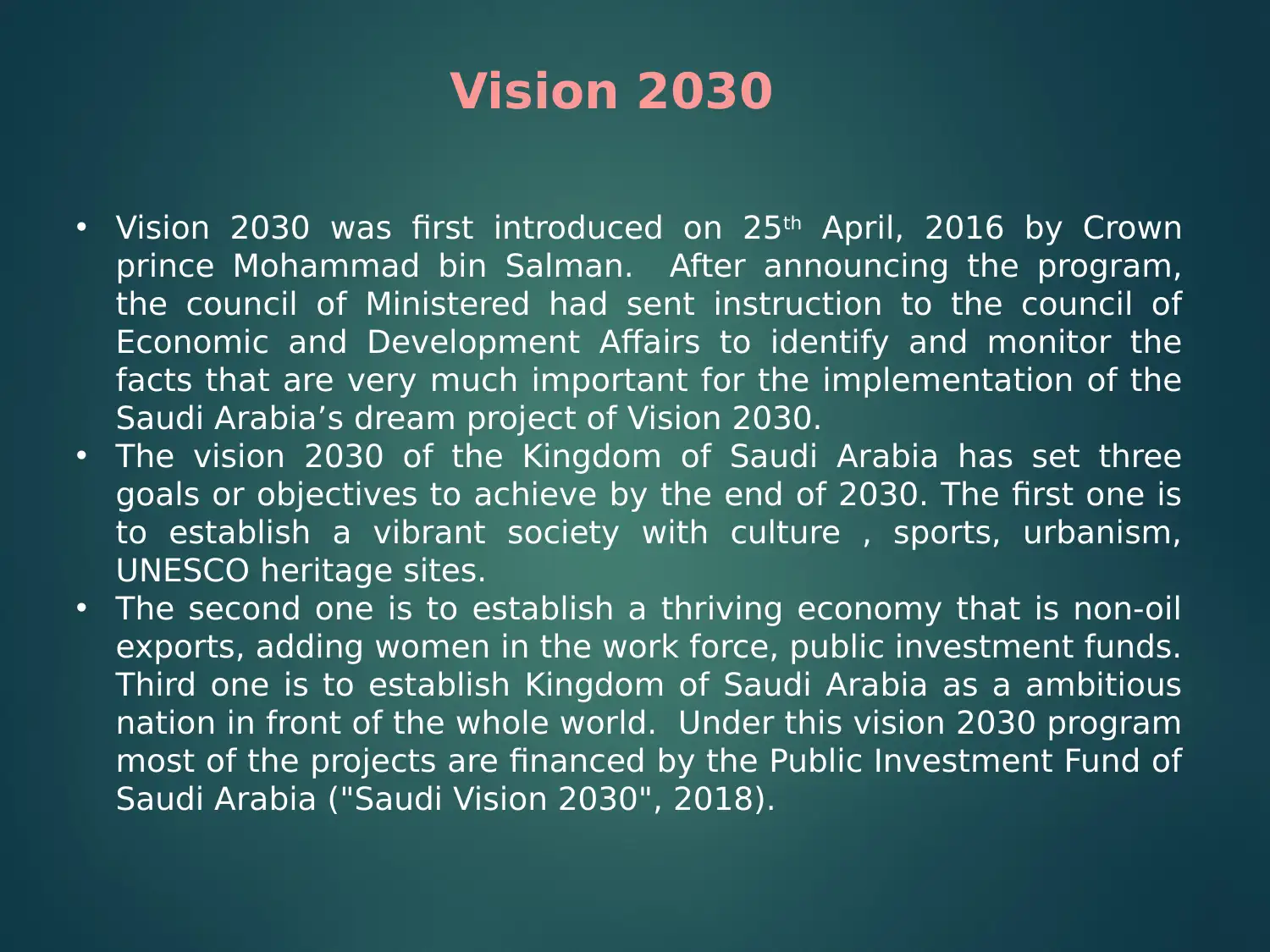
Vision 2030
• Vision 2030 was first introduced on 25th April, 2016 by Crown
prince Mohammad bin Salman. After announcing the program,
the council of Ministered had sent instruction to the council of
Economic and Development Affairs to identify and monitor the
facts that are very much important for the implementation of the
Saudi Arabia’s dream project of Vision 2030.
• The vision 2030 of the Kingdom of Saudi Arabia has set three
goals or objectives to achieve by the end of 2030. The first one is
to establish a vibrant society with culture , sports, urbanism,
UNESCO heritage sites.
• The second one is to establish a thriving economy that is non-oil
exports, adding women in the work force, public investment funds.
Third one is to establish Kingdom of Saudi Arabia as a ambitious
nation in front of the whole world. Under this vision 2030 program
most of the projects are financed by the Public Investment Fund of
Saudi Arabia ("Saudi Vision 2030", 2018).
• Vision 2030 was first introduced on 25th April, 2016 by Crown
prince Mohammad bin Salman. After announcing the program,
the council of Ministered had sent instruction to the council of
Economic and Development Affairs to identify and monitor the
facts that are very much important for the implementation of the
Saudi Arabia’s dream project of Vision 2030.
• The vision 2030 of the Kingdom of Saudi Arabia has set three
goals or objectives to achieve by the end of 2030. The first one is
to establish a vibrant society with culture , sports, urbanism,
UNESCO heritage sites.
• The second one is to establish a thriving economy that is non-oil
exports, adding women in the work force, public investment funds.
Third one is to establish Kingdom of Saudi Arabia as a ambitious
nation in front of the whole world. Under this vision 2030 program
most of the projects are financed by the Public Investment Fund of
Saudi Arabia ("Saudi Vision 2030", 2018).
⊘ This is a preview!⊘
Do you want full access?
Subscribe today to unlock all pages.

Trusted by 1+ million students worldwide
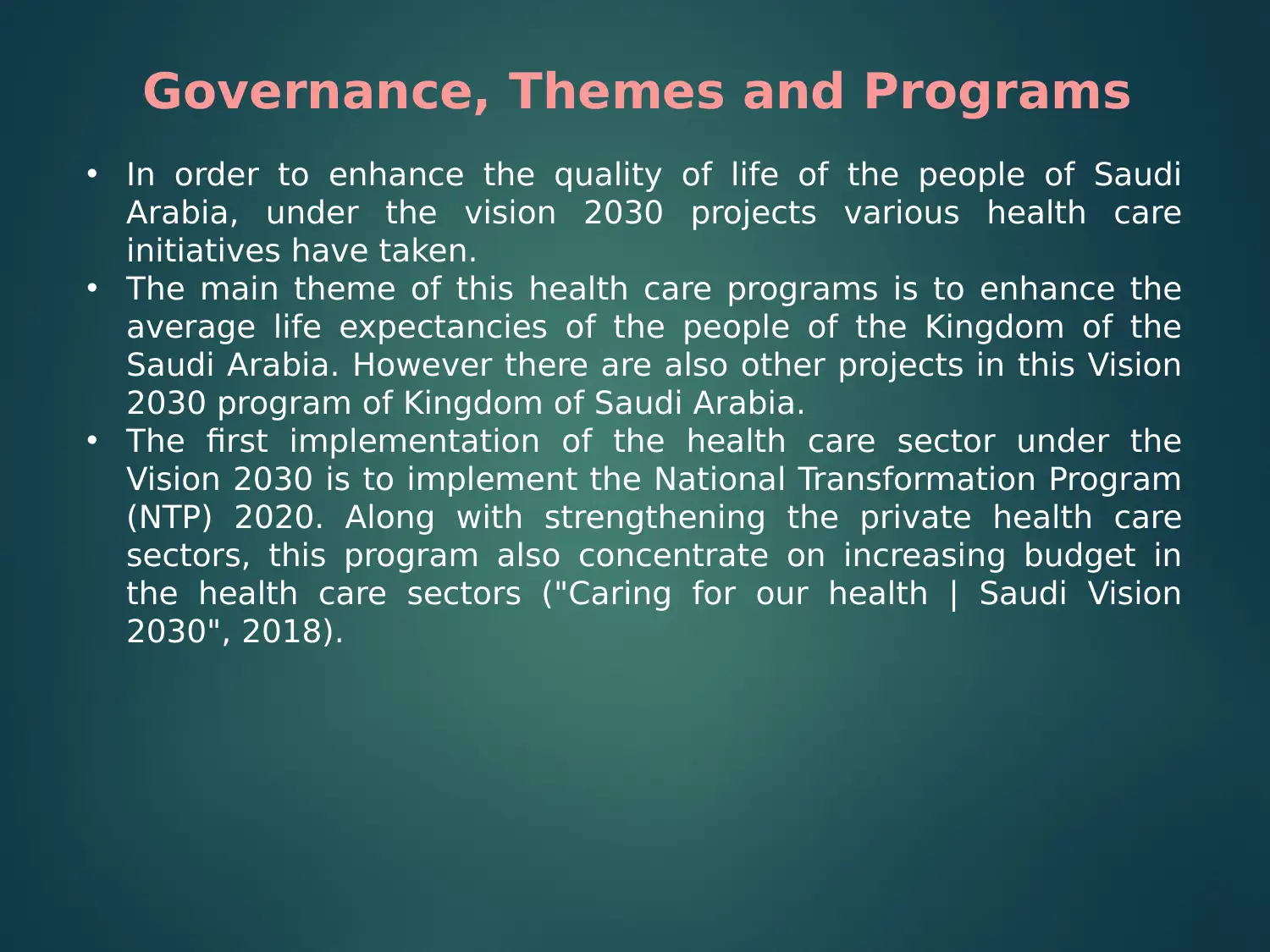
Governance, Themes and Programs
• In order to enhance the quality of life of the people of Saudi
Arabia, under the vision 2030 projects various health care
initiatives have taken.
• The main theme of this health care programs is to enhance the
average life expectancies of the people of the Kingdom of the
Saudi Arabia. However there are also other projects in this Vision
2030 program of Kingdom of Saudi Arabia.
• The first implementation of the health care sector under the
Vision 2030 is to implement the National Transformation Program
(NTP) 2020. Along with strengthening the private health care
sectors, this program also concentrate on increasing budget in
the health care sectors ("Caring for our health | Saudi Vision
2030", 2018).
• In order to enhance the quality of life of the people of Saudi
Arabia, under the vision 2030 projects various health care
initiatives have taken.
• The main theme of this health care programs is to enhance the
average life expectancies of the people of the Kingdom of the
Saudi Arabia. However there are also other projects in this Vision
2030 program of Kingdom of Saudi Arabia.
• The first implementation of the health care sector under the
Vision 2030 is to implement the National Transformation Program
(NTP) 2020. Along with strengthening the private health care
sectors, this program also concentrate on increasing budget in
the health care sectors ("Caring for our health | Saudi Vision
2030", 2018).
Paraphrase This Document
Need a fresh take? Get an instant paraphrase of this document with our AI Paraphraser
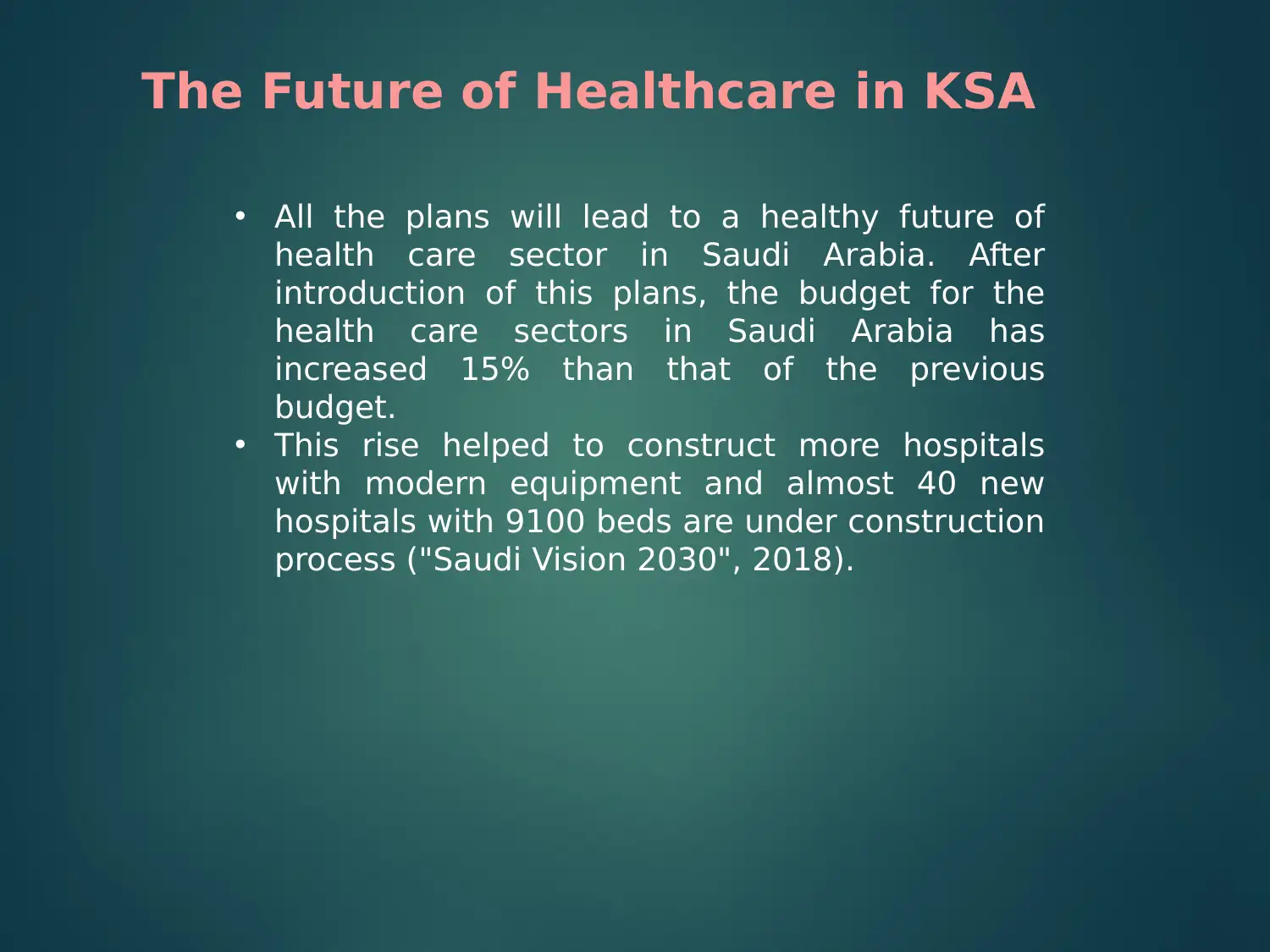
The Future of Healthcare in KSA
• All the plans will lead to a healthy future of
health care sector in Saudi Arabia. After
introduction of this plans, the budget for the
health care sectors in Saudi Arabia has
increased 15% than that of the previous
budget.
• This rise helped to construct more hospitals
with modern equipment and almost 40 new
hospitals with 9100 beds are under construction
process ("Saudi Vision 2030", 2018).
• All the plans will lead to a healthy future of
health care sector in Saudi Arabia. After
introduction of this plans, the budget for the
health care sectors in Saudi Arabia has
increased 15% than that of the previous
budget.
• This rise helped to construct more hospitals
with modern equipment and almost 40 new
hospitals with 9100 beds are under construction
process ("Saudi Vision 2030", 2018).
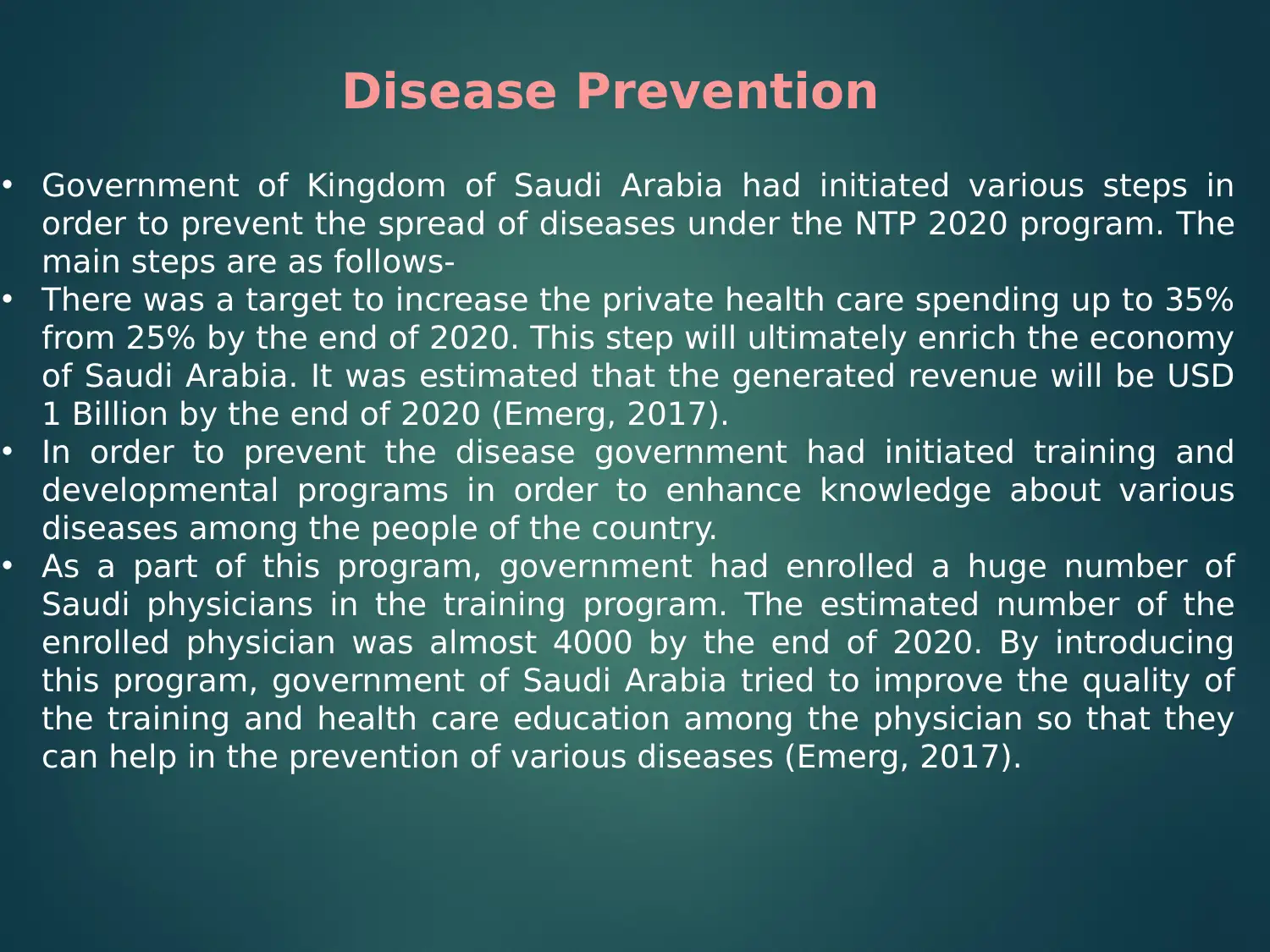
Disease Prevention
• Government of Kingdom of Saudi Arabia had initiated various steps in
order to prevent the spread of diseases under the NTP 2020 program. The
main steps are as follows-
• There was a target to increase the private health care spending up to 35%
from 25% by the end of 2020. This step will ultimately enrich the economy
of Saudi Arabia. It was estimated that the generated revenue will be USD
1 Billion by the end of 2020 (Emerg, 2017).
• In order to prevent the disease government had initiated training and
developmental programs in order to enhance knowledge about various
diseases among the people of the country.
• As a part of this program, government had enrolled a huge number of
Saudi physicians in the training program. The estimated number of the
enrolled physician was almost 4000 by the end of 2020. By introducing
this program, government of Saudi Arabia tried to improve the quality of
the training and health care education among the physician so that they
can help in the prevention of various diseases (Emerg, 2017).
• Government of Kingdom of Saudi Arabia had initiated various steps in
order to prevent the spread of diseases under the NTP 2020 program. The
main steps are as follows-
• There was a target to increase the private health care spending up to 35%
from 25% by the end of 2020. This step will ultimately enrich the economy
of Saudi Arabia. It was estimated that the generated revenue will be USD
1 Billion by the end of 2020 (Emerg, 2017).
• In order to prevent the disease government had initiated training and
developmental programs in order to enhance knowledge about various
diseases among the people of the country.
• As a part of this program, government had enrolled a huge number of
Saudi physicians in the training program. The estimated number of the
enrolled physician was almost 4000 by the end of 2020. By introducing
this program, government of Saudi Arabia tried to improve the quality of
the training and health care education among the physician so that they
can help in the prevention of various diseases (Emerg, 2017).
⊘ This is a preview!⊘
Do you want full access?
Subscribe today to unlock all pages.

Trusted by 1+ million students worldwide
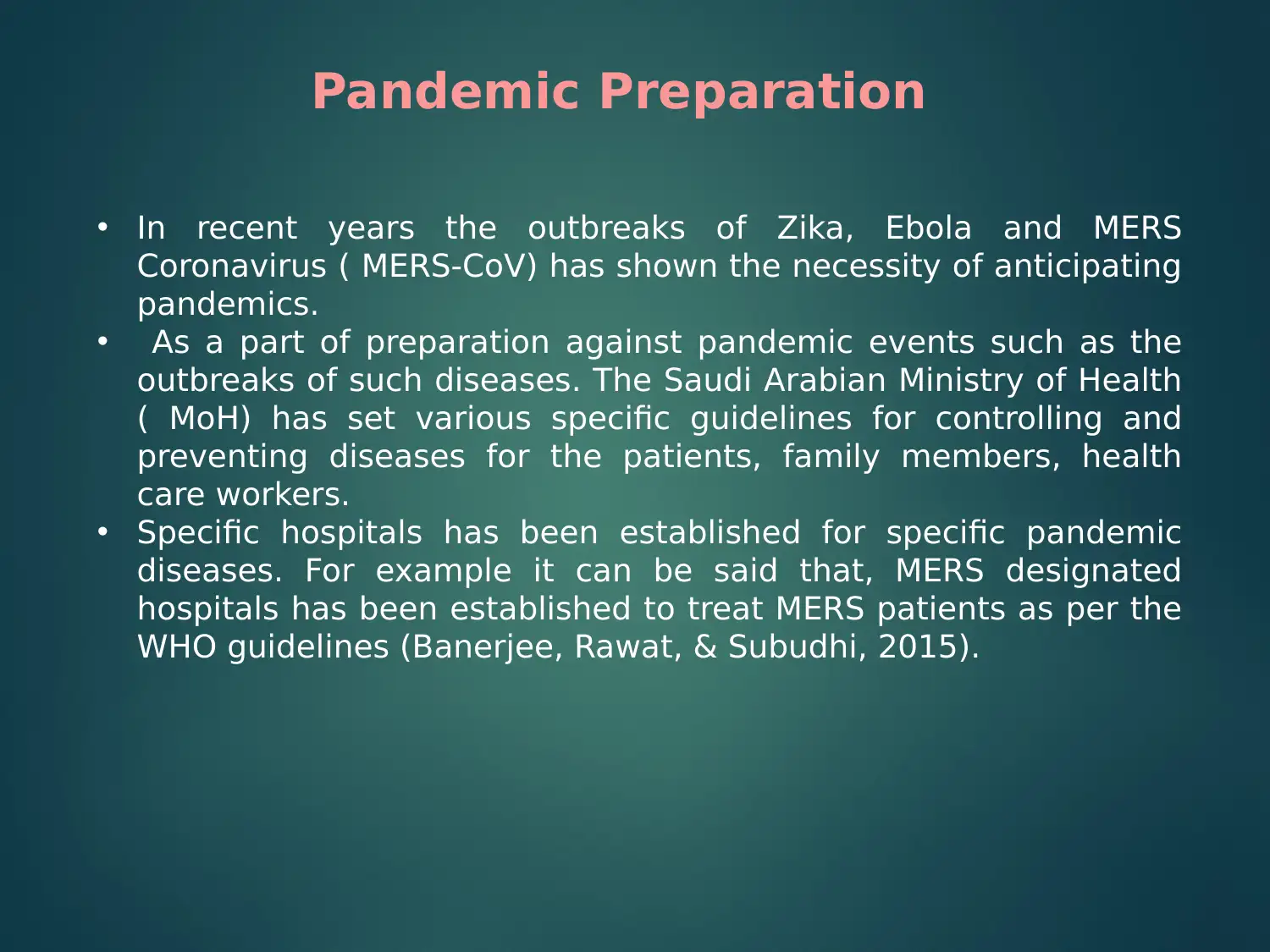
Pandemic Preparation
• In recent years the outbreaks of Zika, Ebola and MERS
Coronavirus ( MERS-CoV) has shown the necessity of anticipating
pandemics.
• As a part of preparation against pandemic events such as the
outbreaks of such diseases. The Saudi Arabian Ministry of Health
( MoH) has set various specific guidelines for controlling and
preventing diseases for the patients, family members, health
care workers.
• Specific hospitals has been established for specific pandemic
diseases. For example it can be said that, MERS designated
hospitals has been established to treat MERS patients as per the
WHO guidelines (Banerjee, Rawat, & Subudhi, 2015).
• In recent years the outbreaks of Zika, Ebola and MERS
Coronavirus ( MERS-CoV) has shown the necessity of anticipating
pandemics.
• As a part of preparation against pandemic events such as the
outbreaks of such diseases. The Saudi Arabian Ministry of Health
( MoH) has set various specific guidelines for controlling and
preventing diseases for the patients, family members, health
care workers.
• Specific hospitals has been established for specific pandemic
diseases. For example it can be said that, MERS designated
hospitals has been established to treat MERS patients as per the
WHO guidelines (Banerjee, Rawat, & Subudhi, 2015).
Paraphrase This Document
Need a fresh take? Get an instant paraphrase of this document with our AI Paraphraser
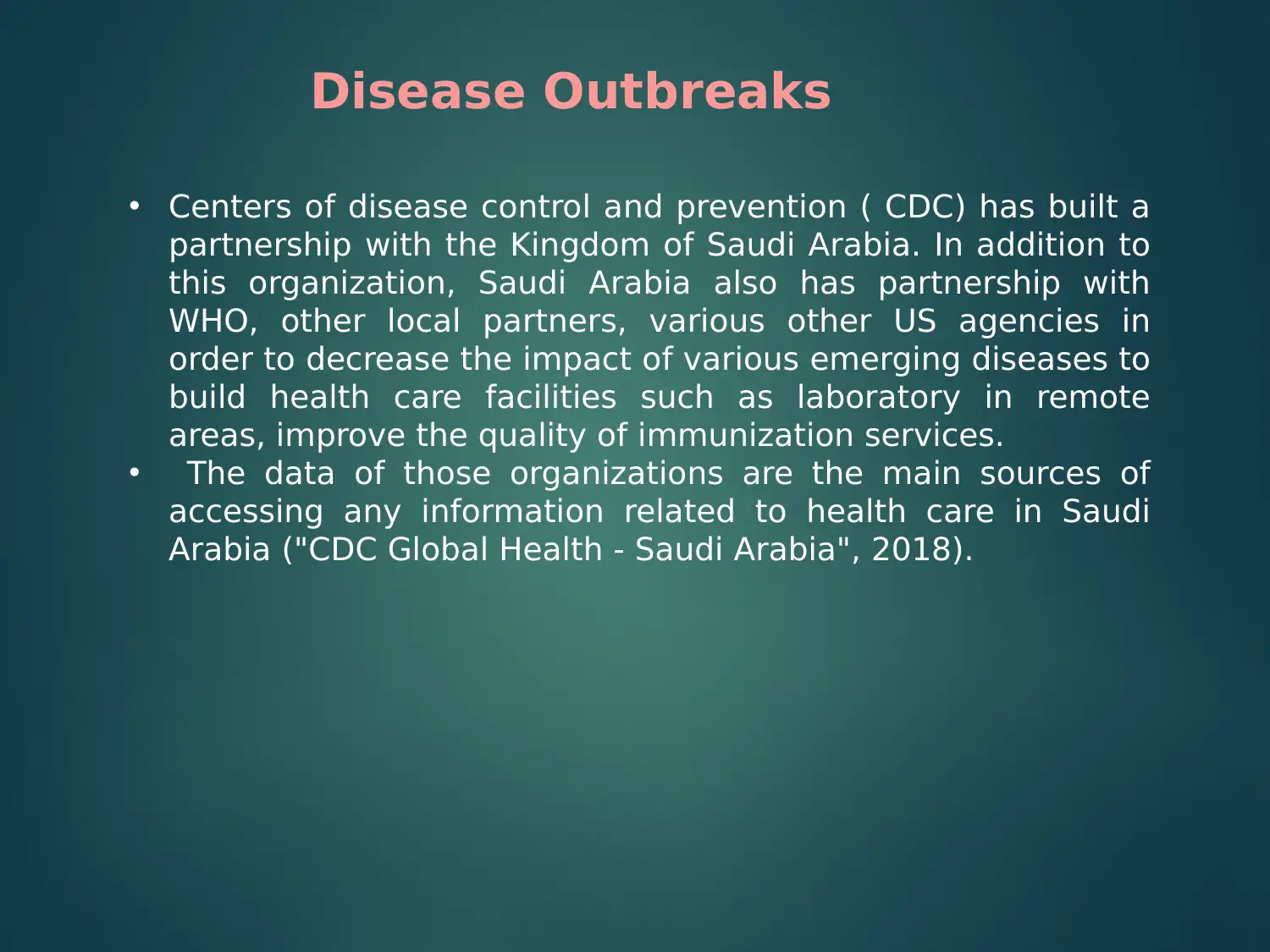
Disease Outbreaks
• Centers of disease control and prevention ( CDC) has built a
partnership with the Kingdom of Saudi Arabia. In addition to
this organization, Saudi Arabia also has partnership with
WHO, other local partners, various other US agencies in
order to decrease the impact of various emerging diseases to
build health care facilities such as laboratory in remote
areas, improve the quality of immunization services.
• The data of those organizations are the main sources of
accessing any information related to health care in Saudi
Arabia ("CDC Global Health - Saudi Arabia", 2018).
• Centers of disease control and prevention ( CDC) has built a
partnership with the Kingdom of Saudi Arabia. In addition to
this organization, Saudi Arabia also has partnership with
WHO, other local partners, various other US agencies in
order to decrease the impact of various emerging diseases to
build health care facilities such as laboratory in remote
areas, improve the quality of immunization services.
• The data of those organizations are the main sources of
accessing any information related to health care in Saudi
Arabia ("CDC Global Health - Saudi Arabia", 2018).
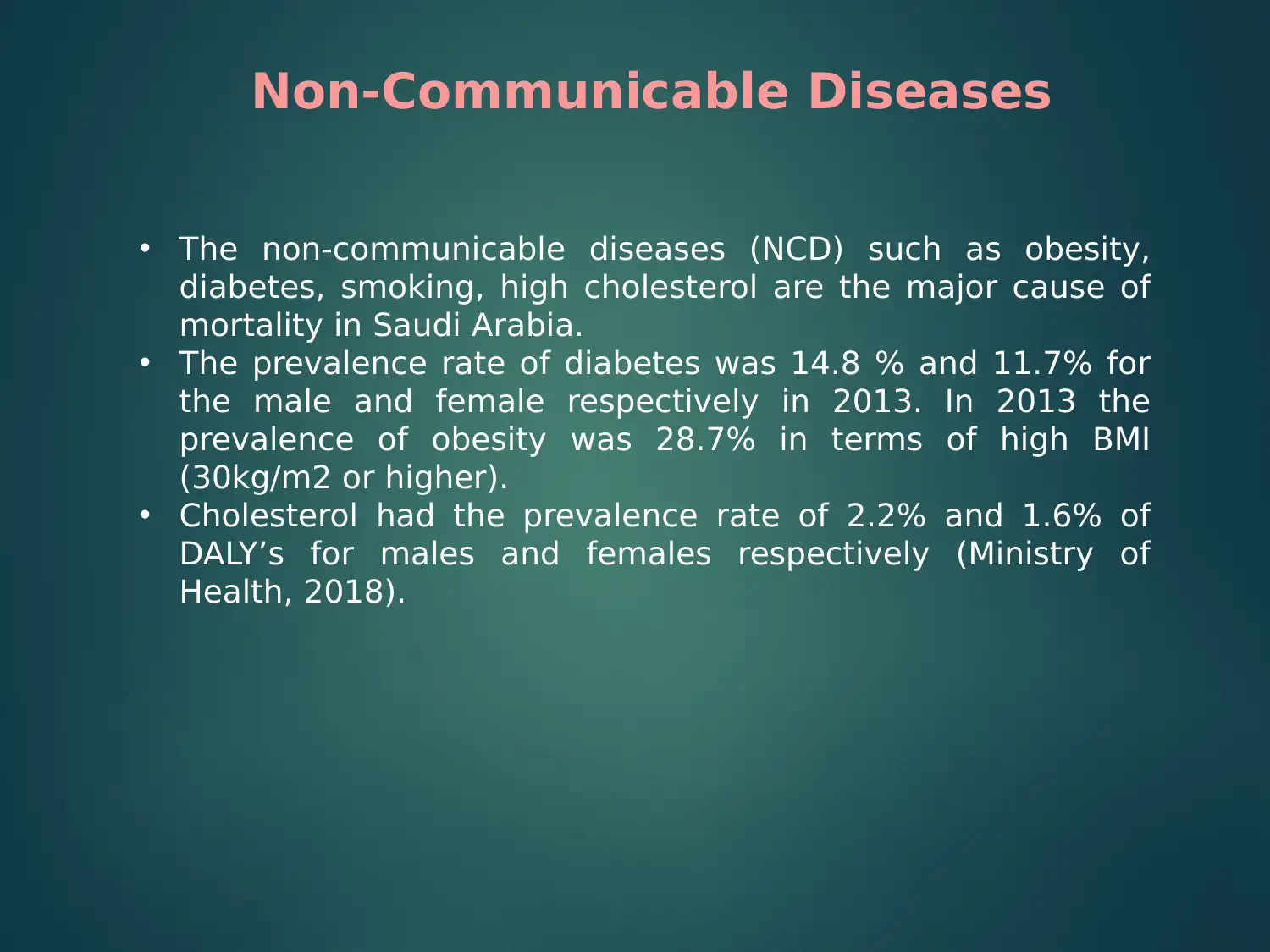
Non-Communicable Diseases
• The non-communicable diseases (NCD) such as obesity,
diabetes, smoking, high cholesterol are the major cause of
mortality in Saudi Arabia.
• The prevalence rate of diabetes was 14.8 % and 11.7% for
the male and female respectively in 2013. In 2013 the
prevalence of obesity was 28.7% in terms of high BMI
(30kg/m2 or higher).
• Cholesterol had the prevalence rate of 2.2% and 1.6% of
DALY’s for males and females respectively (Ministry of
Health, 2018).
• The non-communicable diseases (NCD) such as obesity,
diabetes, smoking, high cholesterol are the major cause of
mortality in Saudi Arabia.
• The prevalence rate of diabetes was 14.8 % and 11.7% for
the male and female respectively in 2013. In 2013 the
prevalence of obesity was 28.7% in terms of high BMI
(30kg/m2 or higher).
• Cholesterol had the prevalence rate of 2.2% and 1.6% of
DALY’s for males and females respectively (Ministry of
Health, 2018).
⊘ This is a preview!⊘
Do you want full access?
Subscribe today to unlock all pages.

Trusted by 1+ million students worldwide
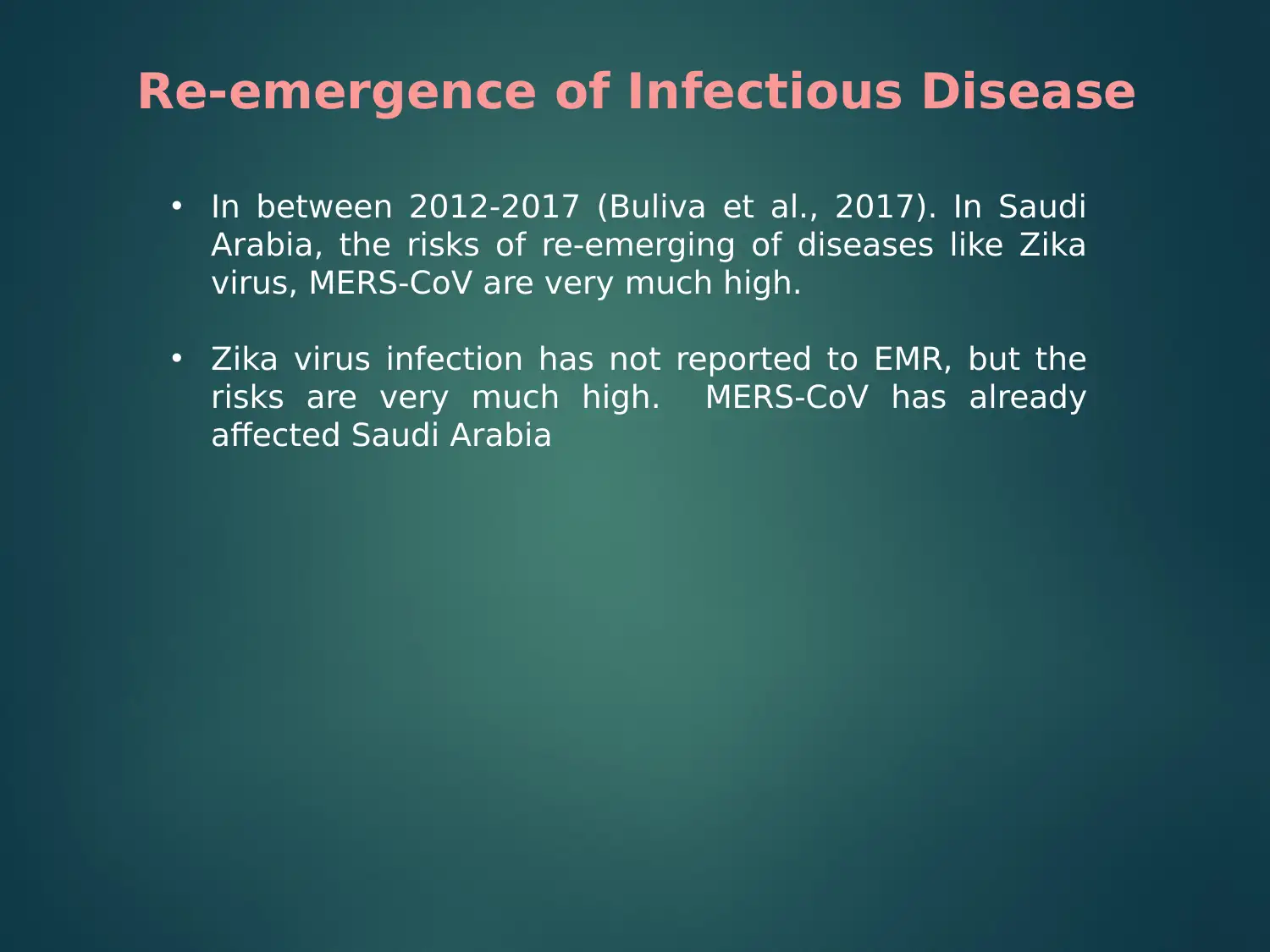
Re-emergence of Infectious Disease
• In between 2012-2017 (Buliva et al., 2017). In Saudi
Arabia, the risks of re-emerging of diseases like Zika
virus, MERS-CoV are very much high.
• Zika virus infection has not reported to EMR, but the
risks are very much high. MERS-CoV has already
affected Saudi Arabia
• In between 2012-2017 (Buliva et al., 2017). In Saudi
Arabia, the risks of re-emerging of diseases like Zika
virus, MERS-CoV are very much high.
• Zika virus infection has not reported to EMR, but the
risks are very much high. MERS-CoV has already
affected Saudi Arabia
Paraphrase This Document
Need a fresh take? Get an instant paraphrase of this document with our AI Paraphraser
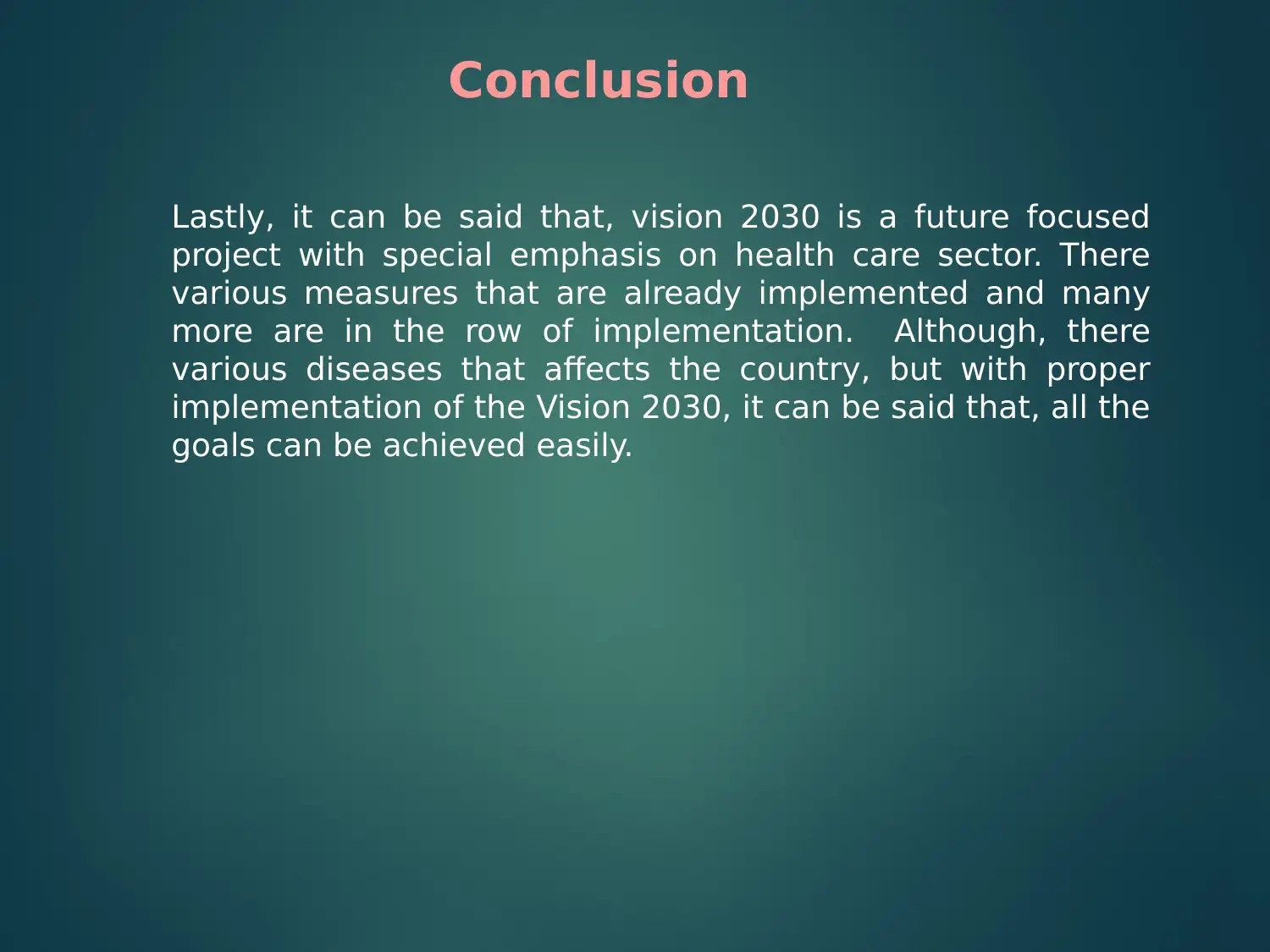
Conclusion
Lastly, it can be said that, vision 2030 is a future focused
project with special emphasis on health care sector. There
various measures that are already implemented and many
more are in the row of implementation. Although, there
various diseases that affects the country, but with proper
implementation of the Vision 2030, it can be said that, all the
goals can be achieved easily.
Lastly, it can be said that, vision 2030 is a future focused
project with special emphasis on health care sector. There
various measures that are already implemented and many
more are in the row of implementation. Although, there
various diseases that affects the country, but with proper
implementation of the Vision 2030, it can be said that, all the
goals can be achieved easily.
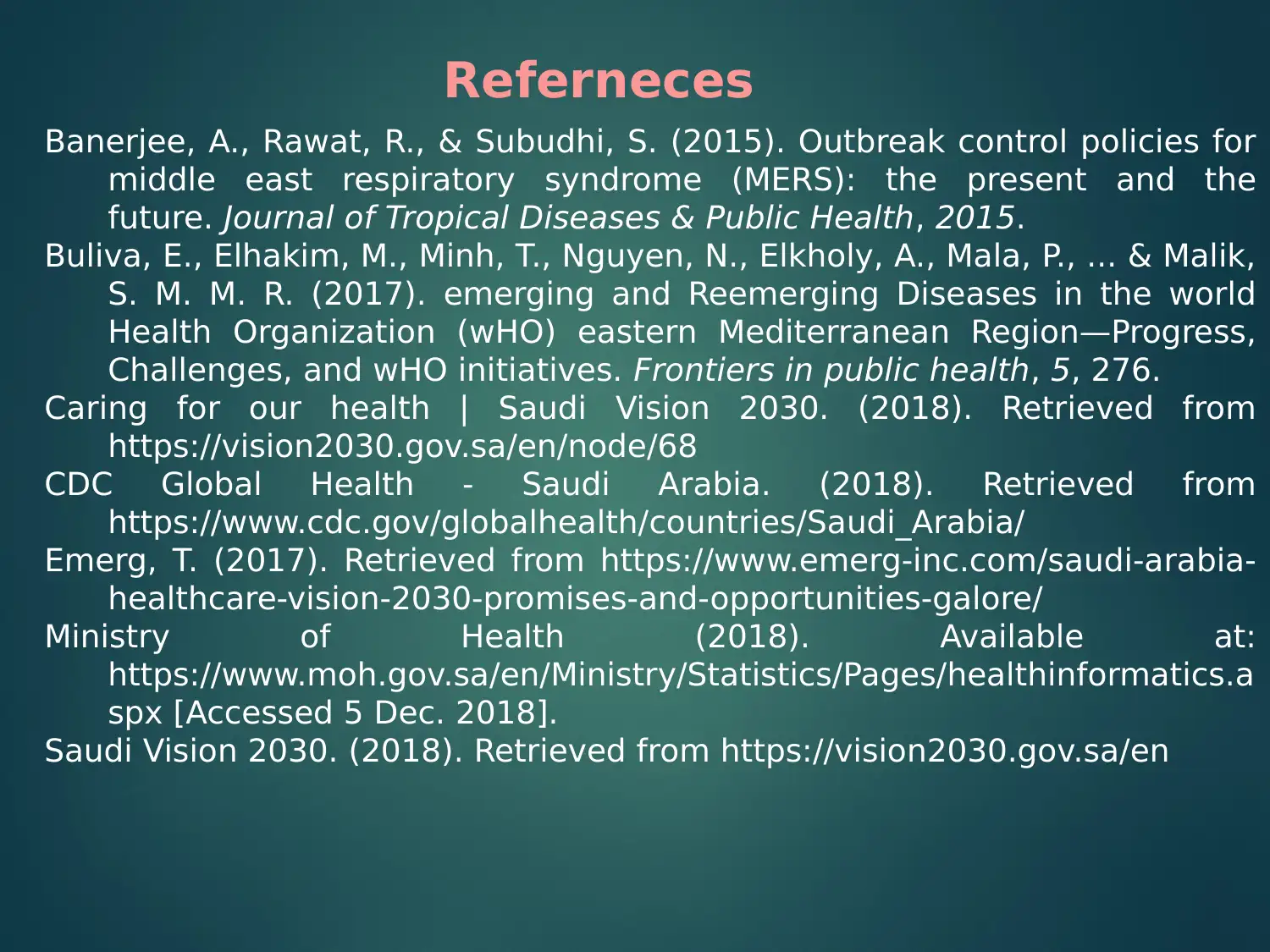
Referneces
Banerjee, A., Rawat, R., & Subudhi, S. (2015). Outbreak control policies for
middle east respiratory syndrome (MERS): the present and the
future. Journal of Tropical Diseases & Public Health, 2015.
Buliva, E., Elhakim, M., Minh, T., Nguyen, N., Elkholy, A., Mala, P., ... & Malik,
S. M. M. R. (2017). emerging and Reemerging Diseases in the world
Health Organization (wHO) eastern Mediterranean Region—Progress,
Challenges, and wHO initiatives. Frontiers in public health, 5, 276.
Caring for our health | Saudi Vision 2030. (2018). Retrieved from
https://vision2030.gov.sa/en/node/68
CDC Global Health - Saudi Arabia. (2018). Retrieved from
https://www.cdc.gov/globalhealth/countries/Saudi_Arabia/
Emerg, T. (2017). Retrieved from https://www.emerg-inc.com/saudi-arabia-
healthcare-vision-2030-promises-and-opportunities-galore/
Ministry of Health (2018). Available at:
https://www.moh.gov.sa/en/Ministry/Statistics/Pages/healthinformatics.a
spx [Accessed 5 Dec. 2018].
Saudi Vision 2030. (2018). Retrieved from https://vision2030.gov.sa/en
Banerjee, A., Rawat, R., & Subudhi, S. (2015). Outbreak control policies for
middle east respiratory syndrome (MERS): the present and the
future. Journal of Tropical Diseases & Public Health, 2015.
Buliva, E., Elhakim, M., Minh, T., Nguyen, N., Elkholy, A., Mala, P., ... & Malik,
S. M. M. R. (2017). emerging and Reemerging Diseases in the world
Health Organization (wHO) eastern Mediterranean Region—Progress,
Challenges, and wHO initiatives. Frontiers in public health, 5, 276.
Caring for our health | Saudi Vision 2030. (2018). Retrieved from
https://vision2030.gov.sa/en/node/68
CDC Global Health - Saudi Arabia. (2018). Retrieved from
https://www.cdc.gov/globalhealth/countries/Saudi_Arabia/
Emerg, T. (2017). Retrieved from https://www.emerg-inc.com/saudi-arabia-
healthcare-vision-2030-promises-and-opportunities-galore/
Ministry of Health (2018). Available at:
https://www.moh.gov.sa/en/Ministry/Statistics/Pages/healthinformatics.a
spx [Accessed 5 Dec. 2018].
Saudi Vision 2030. (2018). Retrieved from https://vision2030.gov.sa/en
⊘ This is a preview!⊘
Do you want full access?
Subscribe today to unlock all pages.

Trusted by 1+ million students worldwide
1 out of 13
Related Documents
Your All-in-One AI-Powered Toolkit for Academic Success.
+13062052269
info@desklib.com
Available 24*7 on WhatsApp / Email
![[object Object]](/_next/static/media/star-bottom.7253800d.svg)
Unlock your academic potential
Copyright © 2020–2026 A2Z Services. All Rights Reserved. Developed and managed by ZUCOL.





